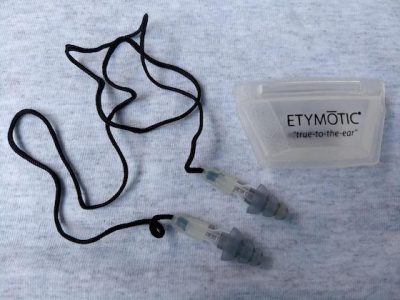Did You Say Hearing Protection!
DEAR TIM: My husband is an avid do-it-yourselfer (DIYr). When I get in our car after he drives it the right stereo speaker is much louder than the left. Could his hearing be going bad. Should I be concerned? Will ordinary household tools cause hearing loss? What do you do to protect your hearing while working on job sites and around the house? Judy - Jasper, AL
DEAR JUDY: It sounds like you have been talking with my wife. I have developed a partial loss in both of my ears. My right ear has suffered significantly. Hearing protection was not even considered 25 years ago when I started in residential construction. I suspect your husband is right handed like me. His use of power tools near his right ear could be the root of the problem. However, there is a slim chance that you are suffering from a hearing loss in your left ear. Don't discount this possibility especially if you cut the grass or play the car stereo too loud.
Besides wax and three tiny bones, our ears contain delicate hair cells. These little cells are the bridges between our ear and the main auditory nerve that enters our brain. If the hair cells become damaged or die from excessive or prolonged loud noise, the brain has no way to recognize "sounds". At this point in human evolution, we can not regenerate hair cells. In my case, this means that I already have permanent hearing loss in my right ear.
Decibels (dBA) are a unit of measure used to compare relative sound intensity. The noise produced by a bowl of crackling Rice Krispies is equal to 30 dBA. An ordinary electric hair dryer may produce 80 dBA of noise. Circular saws and table saws can produce noise in excess of 100 dBA. Believe it or not, a plastic baby rattle can create sounds up to 135 dBA! Hearing loss can begin to accumulate if a person is exposed to noise in excess of 90 dBA for continued periods of time. Young children are especially susceptible to hearing loss. Don't shake a rattle too loudly!
Many household tools, lawn and garden equipment, and automotive stereos pose a serious hearing loss hazard. Lawn mowers can produce noise measured at 120 dBA. Chain saws have been measured at 125 dBA. A high powered car stereo can produce sounds in excess of 150 dBA! Operation of lawn mowers, circular saws, etc. without hearing protection can cause permanent noise induced hearing loss. Remember, hearing damage is cumulative. Each time you operate a circular saw or lawn mower without protection you run the risk of damaging or killing more and more hair cells.
Homeowners, DIYr's and factory workers have an assortment of hearing protection devices from which to choose. Disposable foam earplugs, reusable silicone ear inserts, and full coverage ear muffs do a fantastic job of reducing noise levels in the inner ear. The noise reduction is actually measurable and printed on the packaging.
Believe it or not, when inserted into the ear canal properly, inexpensive disposable foam earplugs can offer the high levels of noise reduction. They can actually cut down excess noise by as much as 15 dBA. Combining earplugs with ear muffs will reduce noise levels even further. However,the cumulative noise reduction rating is not the sum of the two devices. It is usually 125 percent of the sum of the two.
You should urge your husband to select and use ear protection equipment. Have him try all different types. Ask him which one feels the most comfortable. Hearing devices that provide the most comfort will generally be worn most often. I happen to prefer the silicone ear inserts used in combination with padded ear muffs. Do not underestimate the seriousness of hearing loss. My wife constantly has to repeat things to me because of my problems. Hopefully it is not too late for your husband.

These are the Etymotic earplugs I used while target shooting. I found they were well suited for that activity. I know for any building noise, they'd work well.
Author's Notes - November 1997:
Several days ago, I used the simple foam ear plugs while operating a loud leaf mulcher. I was amazed at how well the foam plugs blocked sound.
Prior to using the foam plugs, I had used some silicone ear plugs. The foam plugs did a much better job of sealing the air passageway in my ear.
Be sure you try to find the foam plugs before your next LOUD job!